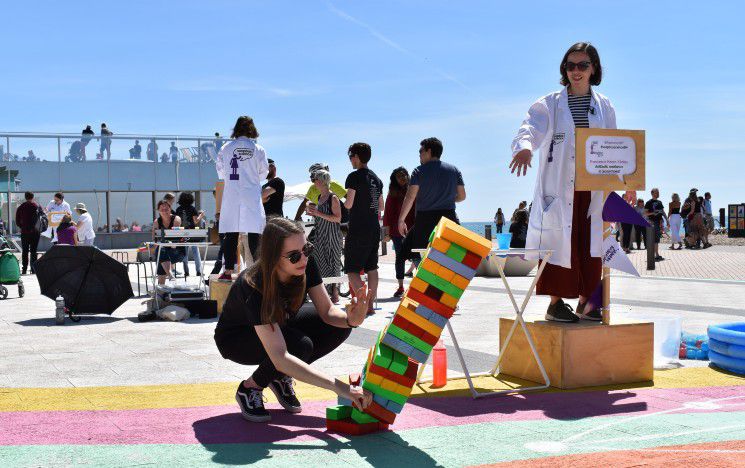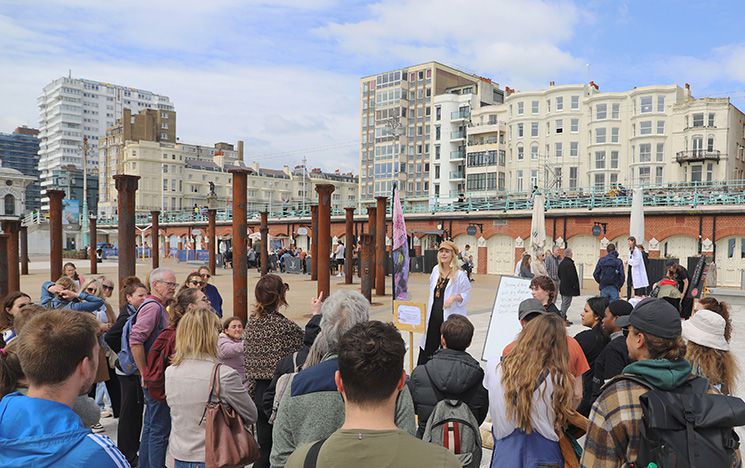Soapbox Science
Discover Soapbox Science Brighton – an annual event organised by Sussex academics that celebrates and promotes women in STEMM (Science, Technology, Engineering, Maths, Medicine).

Soapbox Science Brighton has been running since 2017, and is organised by staff from the School of Life Sciences and the School of Mathematical and Physical Sciences.
The annual event usually takes place on the Brighton seafront, next to the i360 and opposite the West Pier, and is now part of the Brighton Fringe festival. There are no PowerPoint slides or computer screens – just remarkable women in science who are there to amaze the public with their latest discoveries.
Soapbox Science Brighton, Saturday 24 May 2025
Soapbox Science Brighton 2025was held on Brighton & Hove beach on Saturday 24 June 2025, when we were graced with wonderful weather and enthusiastic crowds throughout the event.
A variety of topics were covered on the day, with subjects ranging from plastic ingestion by UK hedgehogs through to dark energy and the sub-atomic secrets of the cosmos. Passers-by were encouraged to think about the human body in new ways, with a talk from Professor Claire Smith about why some humans possess muscles that others don’t, and a presentation by Dr Liat Levita about the unique sensitivities of the teenage brain.

Speaking about the day, Dr Levita said, “Soapbox Science was a blast! The audience's engagement, genuine interest, and fun interactions were amazing. I started by asking people to shout out their first thoughts about teens. Many negative responses came up, which we listed on a board—it was a bit shocking but not surprising.
My aim was to shatter these misconceptions and highlight how incredible teens are. I emphasized that adolescence is a prolonged developmental period—from puberty to the mid-twenties—marked by incredible brain changes. Supporting young people during this normal developmental phase is vital. The insightful questions and deep interest from the audience were inspiring—I just want to do it again!”
For more information about other Soapbox Science events around the world, visit the Soapbox Science website.
- Video transcript
[Shots of Brighton including the seafront and West Pier and a woman putting up a parasol. Dr Hadia Almahli walks along the promenade]
This is Dr Hadia Almahli.
She is a researcher and lecturer specialising in drug discovery.
She spoke at this year's Soapbox Science event.
Hadia: Usually Soapbox Science runs each summer, here on the seafront in Brighton, because it's a busy area with a lot of people here on the beach, from different nationalities, different backgrouns and different ages. People walk by and they can stop or we can stop them to inspire them about our experiences in research and to encourage them to be involved in science.
Sorry... let's start again.
I feel so excited to be a scientist.
Since my childhood, I've seen a cartoon film on TV in Syria about Marie Curie. Marie Curie is a scientist - chemist- ans she's the first woman in the world to win a Nobel Prize twice, and the first woman to be a Professor in Paris University. She struggled a lot in her life. She lost everything from her paternal side and maternal side - properties, everything. It's very similar to my situation as we lost everything in Syria after the war, so we started from zero again.
Our message to all people, especially young people, through this event is try to read more about science, and dream about science. All these fields lead to one thing - to help other people. To save their lives, improve their lives. Our target is human. Whatever life throws at you, just work hard, think big and follow your dreams. Don't stop!
[End credit shows University of Sussex logo].